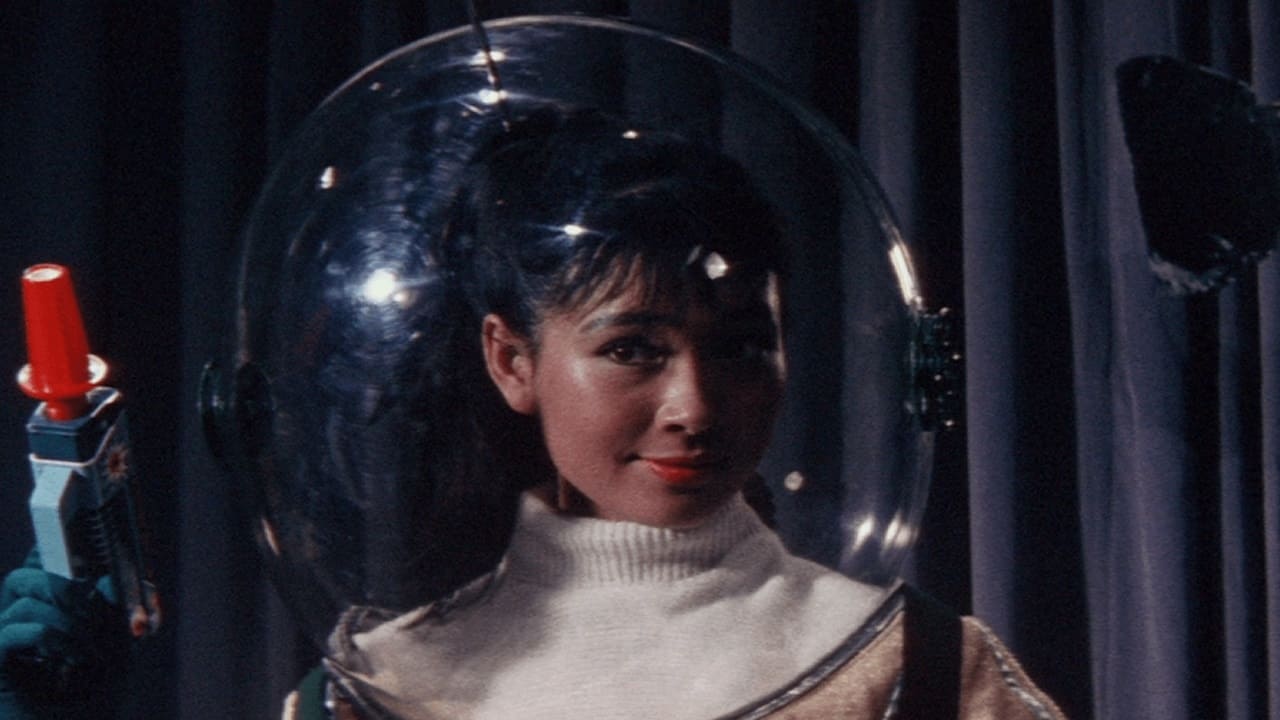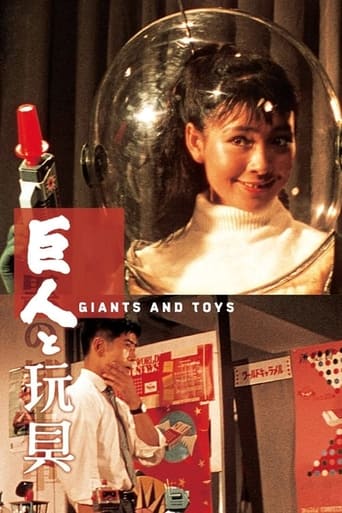overdarklord
Giants and Toys is a movie with lots of very interesting ideas and if the movie would have been done right it could have easily been a 9/10 for me, which, if you know me, is not a score I give a movie for free. The directing of this movie however missed the point and there was no focus which made the movie seem like a bit of a mess and after you finish it, rather than a coherent picture only bits and pieces stick with you which were the great parts and ideas of the movie.The tone for example was all over the place. It started off as a fast paced comedy and then later introduced dramatic and thought provoking concepts that deal with the ruthlessness of business and the suffering people have to endure to succeed. Those 2 tones don't really mix well and slowing down your pacing in order to really capture your image of business would have helped to really convey the idea.The movie also deals with the idea of how people change and become monsters when they become inclined in the nature of business, but sadly didn't manage to capture that with their most important character, the protagonist. He starts off as a naïve young guy new to business and ends in the same way while everything around him changes. I sadly very rarely see in Japanese movies this sort of character development where a good guy is turned into some sort of monster through his environment (you have a few movies which go somewhat in that direction, such as Akira, but you don't have those character developments in Japanese movies as you see in: Citizen Kane, the shining, lord of war, blow or prestige). This sort of character development that can really hammer home the ideas behind the movie is sadly missing in some movies that would really need it, most noticeable this movie.
So yeah, Giants and Toys is a good movie, its entertaining well-acted, nicely shot, has a lot to say about businesses and how they are run and is surely worth a watch, but with the right focus to what this movie actually should be, it could have been way better (but ofc also way worse depending on the focus).
morrison-dylan-fan
After seeing the superb Pop-Art of 1961's Killers on Parade,I spoke to fellow IMDber ManFromPlanetX about other movies from Japan he would rec. Having got hold (and been meaning to view) since Christmas, I was excited to see PlanetX give high praise for this film, which led to me finally getting the toys out of their boxes.View on the film:Advertising from Takeshi Kaikô's novel,Yoshio Shirasaka's adaptation has a cynicism that feels timeless, centred in the (m)ad men controlled industry,where quality of the product is ignored for which business/ad agency can come up with the most attention-grabbing gimmick. Pulling Shima kicking and screaming into the industry, Shirasaka attacks the public personal connection with the "brand" with mischievous satire breaking the cogs of the three major companies, who are led by grinders whose goal is to crush Shima/ customers that chomp on the profits.Made years before the first notes of modern Pop music were played, director Yasuzô Masumura & cinematographer Hiroshi Murai follow Shirasaka with an ultra-stylisation that is ahead of its time, via the ad men offices and mountains of future gimmicks being washed in dazzling Pop-Art that gives the sharp satire a candy coloured shine. Dancing to Shima's fight for independence with a left-field dance number, Masumura opens up the corporate culture with pans across board tables, glances at stacks of glossy mags and overlapping images of machines drilling into the mindset of the ad men.Caught in the middle of the ruthless ad wars, Hitomi Nozoe gives a fantastic performance as Shima,whose chocolate wouldn't melt in her mouth endearing innocence Nozoe brings her in with,is moulded by Nozoe into a snappy,business savvy eye of escaping from the world of giants and toys.
Brian Camp
Yasuzo Masumura's GIANTS AND TOYS (1958) focuses on the antics behind a publicity campaign for a Japanese brand of caramel candy put out by a company, World Caramels, that's trying to wrest market share from two rivals, Giant and Apollo. Goda (Hideo Takamatsu), the ambitious publicity executive assigned to run the campaign, spots a teenage girl, Kyoko Shima (Hitomi Nozoe), on the street and recruits her to be the public face of the company, planning to put her in a space suit while promoting the candy. He hires Harukawa (Yunosuke Ito), a cynical, alcoholic photographer known for his work with young models, to take the pictures that will put Kyoko's face in popular magazines, and encourages a junior publicist, Nishi (Hiroshi Kawaguchi), to romance Kyoko since she seems to like him. Despite Kyoko's charms, Nishi wants no part of it and instead pursues the crafty Kurahashi (Michiko Ono), an attractive, slightly older counterpart working at the rival company, Apollo. Kyoko, an impetuous, gap-toothed wild child with a ready smile and a lack of inhibition, still has to be persuaded--even coerced--into posing for the initial set of photos, but she gradually comes to like the fame and, more importantly, the money, which enables her to leave her large family in a Tokyo slum district behind. Eventually, success goes to her head and she is soon mulling offers from the candy rivals, a testament to the power of Nishi's rejection of her. Goda, who is married to his department head's daughter, is under extraordinary pressure to increase sales, so he drives himself and everyone around him relentlessly. The satirical tone of the early scenes gives way to a very harsh critique of Japanese society in the postwar era on the verge of its highly-touted "economic miracle." When the film focuses on Kyoko, it's very charming and often quite funny. She reminds me of a looney, working-class Audrey Hepburn. Her impulsive behavior around the male characters may not be the most ladylike but it's really cute and even a little sexy. The photographer, Harukawa, is also very funny. He's brutally frank, acerbic and full of thoughts on a wide range of subjects. When he's interviewed by a pack of reporters, he tells one of them, "Your magazine is full of crap," before launching into a rambling monologue on famous western poets and their writing and meditating habits ("Byron wrote poems while inflicting self-torture") before lamenting that "Japanese novelists meditate on the toilet." At one point, in a bar watching Japanese women dance with western men, he expounds on the reason for Japanese women's preference for western men, something to do with the difference in physiques between the two races. I could have listened to him for much longer. Unfortunately, the bulk of the film shifts from Kyoko and Harukawa to the two World publicity execs and they just aren't that interesting. Eventually, it comes down to a moral debate between Goda, who justifies every cutthroat tactic he can think of as part of some nationalist impulse, and Nishi, who questions the ethics of what they're doing, culminating in a bleak, unsatisfying ending.There is lots of dialogue about the Japanese way in the postwar era and what's needed to survive and thrive, with Goda's position thought to be at odds with traditional Japanese values. Many on the staff side with Goda and when one character complains that what worked in America won't work in Japan, another executive declares, "America is Japan." Goda increasingly becomes a caricature as the film progresses. When Nishi objects to the way Kurahashi is trying to hire Kyoko away from World to work for Apollo, especially after he's revealed his company secrets to her during their affair, she dismisses it with this line: "Work is work and love is love. We love as we cheat. It's so thrilling. It's love that will last." Which struck me as a very odd thing to put in such a character's mouth, unless something was lost in the subtitled translation. The whole sales war between Giant and World becomes an unlikely media event, as if the public would even care about two caramel companies. The film hits us over the head with all these messages without really working them into the fabric of the story. They seem forced.Other Japanese films from the postwar era managed to incorporate these kinds of criticisms in a much less heavy-handed way, making points through story and character. Akira Kurosawa's HIGH AND LOW (1963) examines the battle between a conscientious executive and the company directors' greed through the prism of a crime story involving a kidnapping. Keisuke Kinoshita's THUS ANOTHER DAY (1959) looks at the plight of a salaryman desperately trying to get ahead and the strain it puts on his family, but lays out its critique entirely through the way characters behave and the shifting of relationships. (I've also reviewed this film on IMDb.) Nagisa Oshima and Koreyoshi Kurahara, two directors who were even younger than Masumura, also managed to layer their films of the 1950s and '60s with incisive social critiques of Japan, but they did it without making Japan look foolish, which is what Masumura does here. GIANTS AND TOYS has been compared to such American counterparts as Frank Tashlin's WILL SUCCESS SPOIL ROCK HUNTER, Billy Wilder's THE APARTMENT, Alexander Mackendrick's SWEET SMELL OF SUCCESS and Elia Kazan's A FACE IN THE CROWD, but those films managed to make their points without making America look foolish or hateful.

